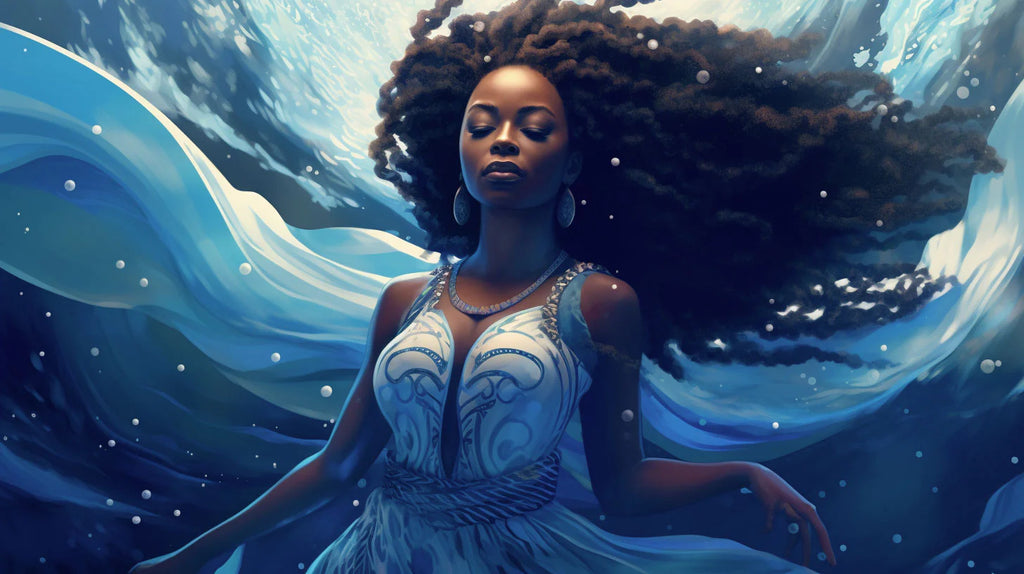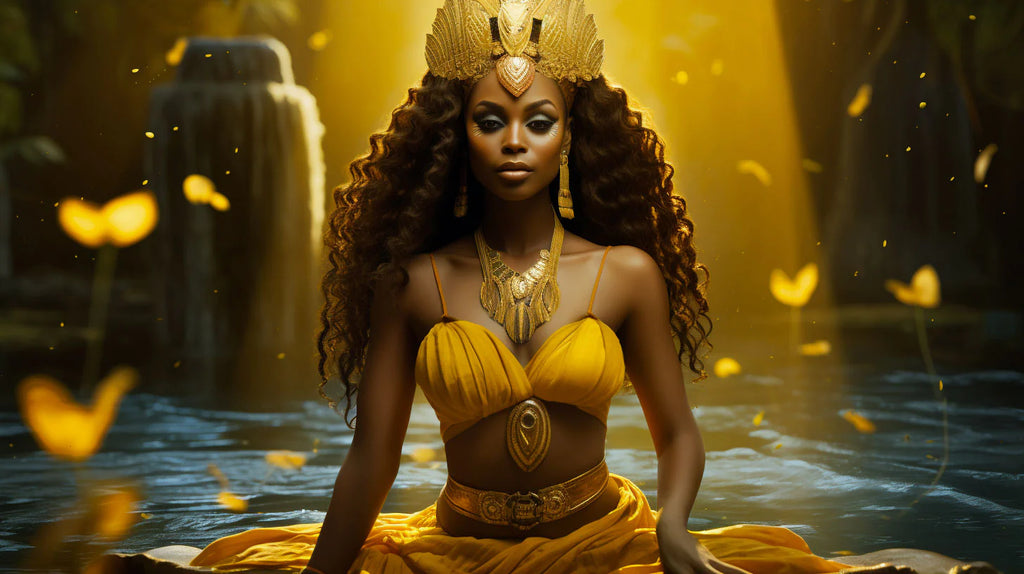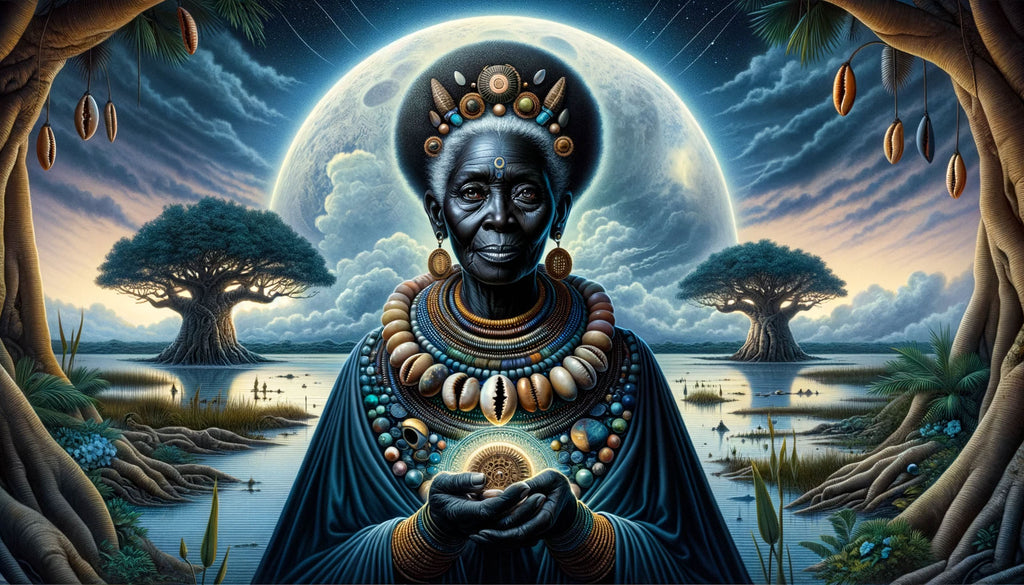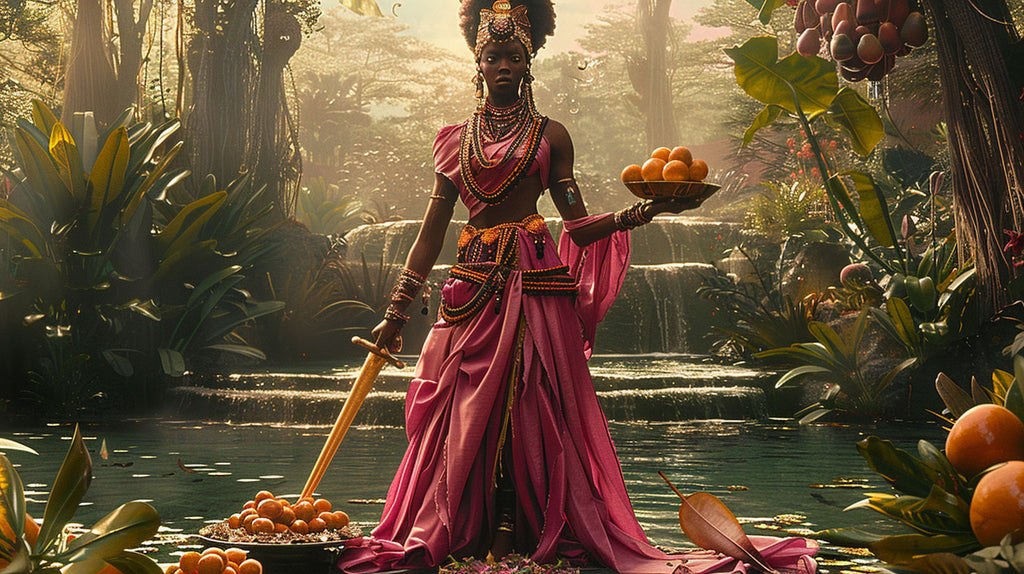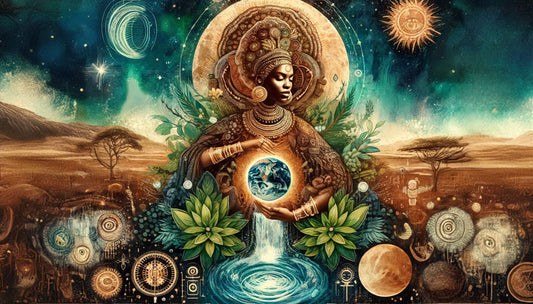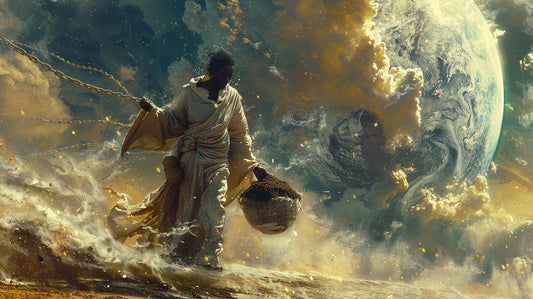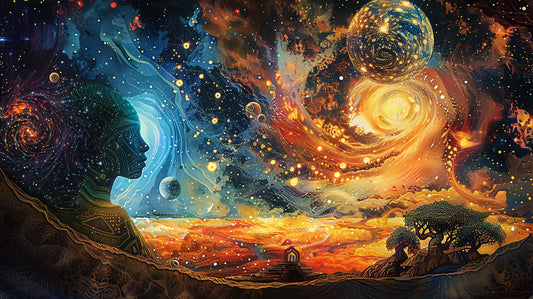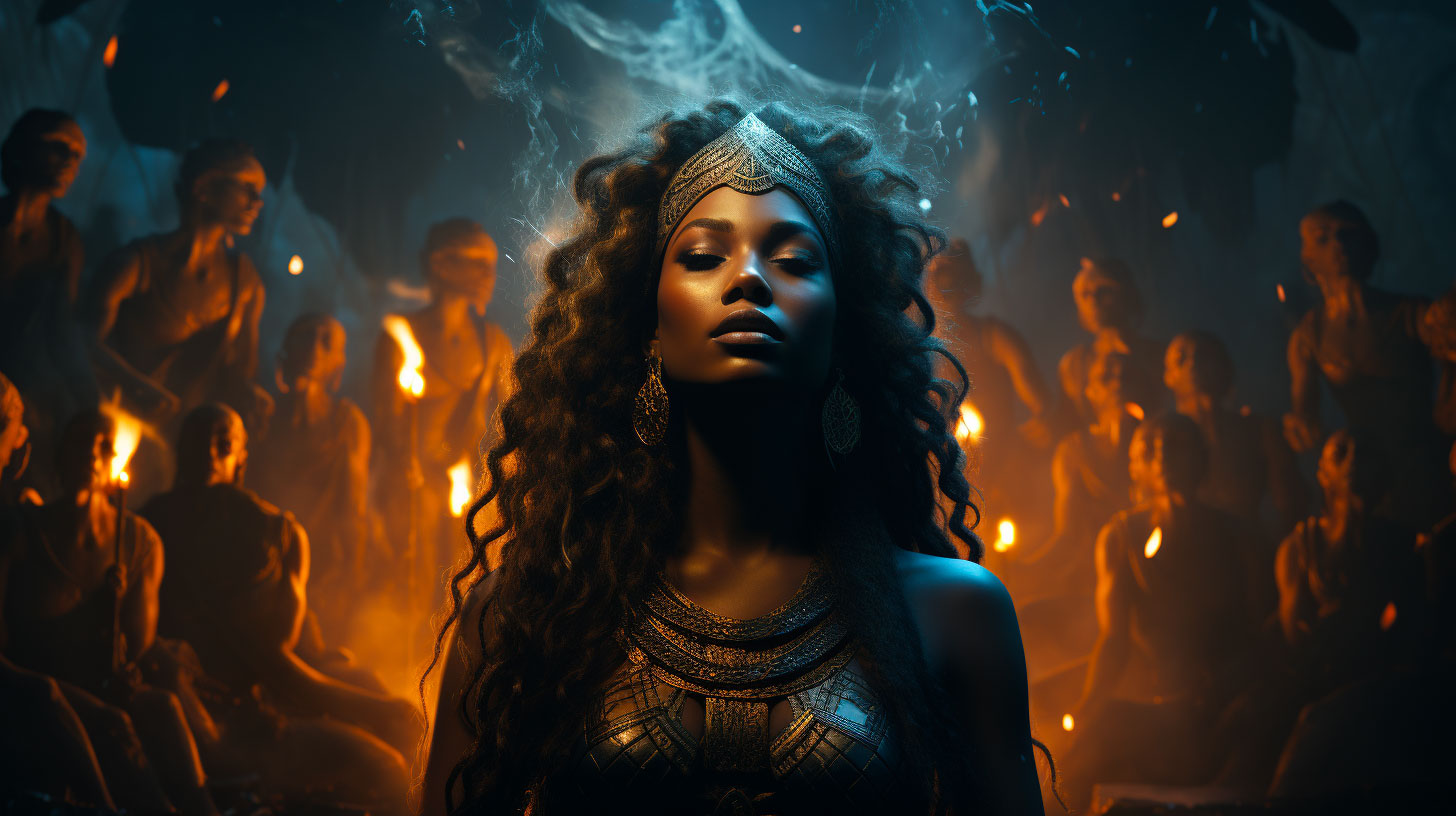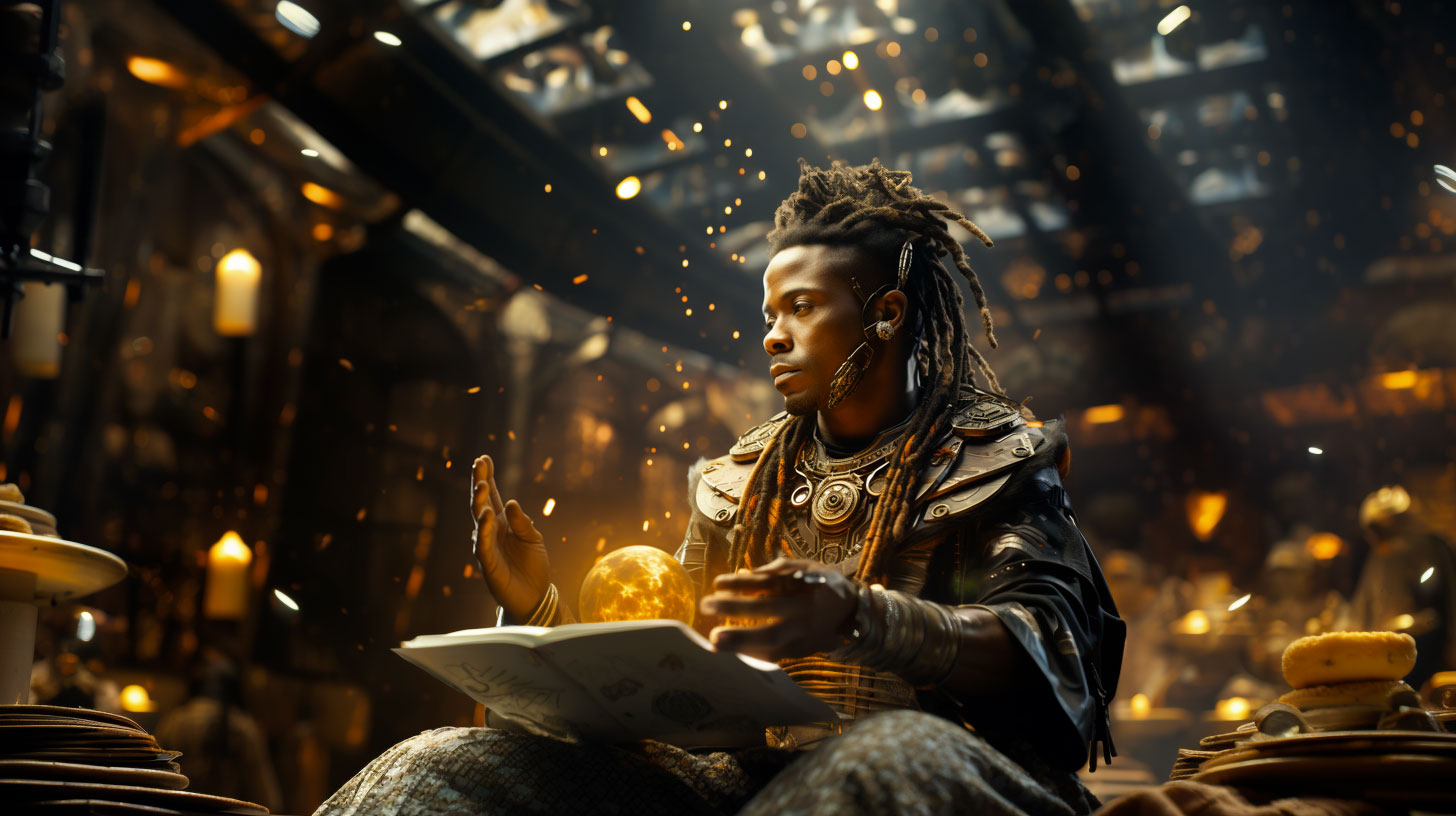11 African Goddesses Associated With Motherhood & Fertility
Gil SantosDive into the realm of African deities and meet goddesses symbolic of motherhood and fertility. These pivotal figures shape cultural stories across Africa and its diaspora, embodying creation, strength, and nurturing. Discover goddesses like the Egyptian Isis, famed for her healing magic and protection, and Yoruba's Oshun, goddess of love and fertility, known for bringing prosperity and balance. Join us on a fascinating journey through mythology and tradition as we highlight African goddesses of motherhood and fertility.

Key Takeaways
- Understanding the Roles: African goddesses like Mawu-Lisa and Isis play a crucial role in symbolizing motherhood and fertility, highlighting the importance of these aspects in various African cultures. This shows how deeply motherhood and fertility are revered across different societies.
- Cultural Significance: Each goddess, from Yemoja to Oshun, carries unique stories and teachings that reflect the values and beliefs of their people. Learning about them helps us appreciate the diversity and depth of African spiritual traditions.
- Practical Applications: For those interested in spirituality or cultural heritage, incorporating knowledge about these goddesses into personal practices can foster a deeper connection with these ancient wisdoms. Whether through art, meditation, or storytelling, there's a way to make this knowledge alive today.
- Educational Value: Educators and students can use the stories of Hathor, Asase Ya, and others as a rich source for learning about mythology, history, and the role of divine femininity in society. It's a great way to make learning about different cultures engaging and relatable.
- Community and Healing: Understanding the significance of goddesses like Nana Buluku and Oba in their respective cultures can offer insights into community healing practices and the role of women in societal cohesion. This can inspire community-driven initiatives focused on healing and unity.
- Inspiration for Creativity: Artists, writers, and creators can draw inspiration from the myths and symbols associated with these goddesses, from Mami Wata's mysterious allure to Aje's association with wealth, to create new works that resonate with timeless themes of life, fertility, and empowerment.
Mawu-Lisa: Goddesses of Harmony and Creation
In the mythology of the Fon people from West Africa, Mawu-Lisa stands out as a unique dual deity that embodies both the moon and the sun. This intertwining of celestial bodies represents more than just night and day; it's a profound symbol of balance and harmony between male and female principles.
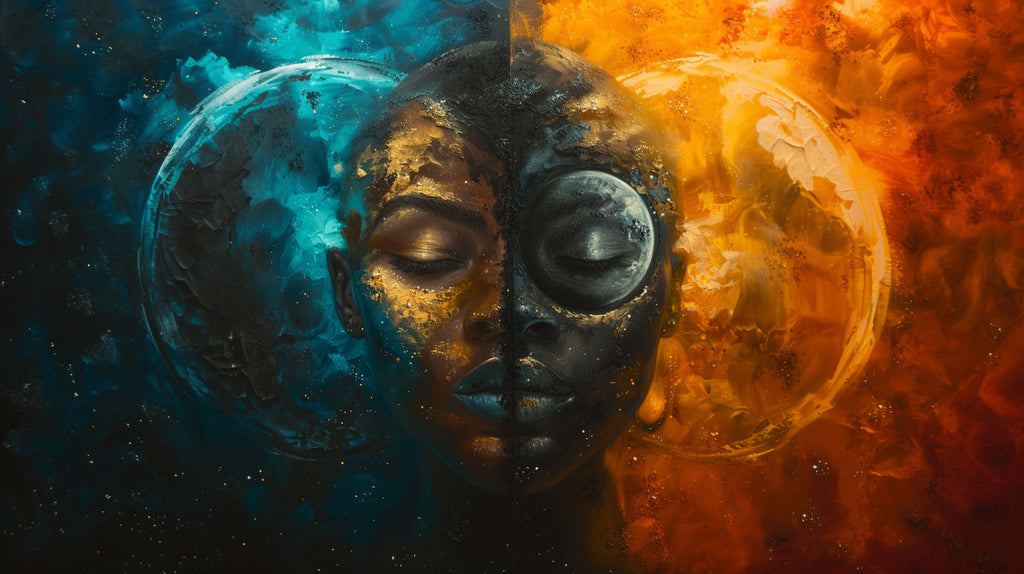
Mawu, the moon aspect, is often associated with coolness, peace, and fertility, while Lisa, representing the sun, brings warmth, energy, and life. Together, they oversee vital aspects of human life such as childbirth and agriculture.
Mawu-Lisa's role in fertility is not limited to humans alone but extends to the earth itself. They are credited with making the soil fertile and ensuring that crops grow healthy and strong. This connection between agricultural prosperity and divine influence highlights how deeply intertwined spiritual beliefs and practical needs were for the Fon people.
The concept of motherhood under Mawu-Lisa's watchful eyes transcends physical birth. It encompasses nurturing, protection, and guidance for all living things. Their story teaches us about the importance of balance—between giving and taking, growth and rest, male and female energies—in sustaining life.
Link: Wikipedia
Isis: Goddess of Magic, Motherhood, and Fertility
Isis stands out as a pivotal figure in Egyptian mythology, embodying the essence of magic, motherhood, and fertility. Her protective aura wasn't just limited to children but extended to the dead, showcasing her as a guardian through life and beyond. This dual role highlights her profound connection to both the creation of life and the afterlife, underscoring her importance in ancient Egyptian society.

The legend of Isis and Osiris is a testament to her determination and magical prowess. After Osiris was betrayed and killed by Set, Isis's relentless search for his body parts across Egypt and her use of magic to resurrect him speak volumes about her capabilities. This act not only brought Osiris back to life but also symbolized the cycle of regeneration, reinforcing her status as a deity of fertility.
Isis's influence reached far beyond the sands of Egypt. Her worship spread to Roman and Greek cultures, where she was embraced as a universal mother figure. This cross-cultural veneration underscores her appeal as a goddess who transcends geographical boundaries, resonating with diverse groups for her nurturing qualities.
Link: Wikipedia
Yemoja: Goddess of the Sea and Motherhood
Yemoja holds a pivotal role in the Yoruba religion as a deity linked to water, fertility, and motherhood. She is celebrated for her nurturing nature and her protective stance over women and children.
As the mother of all Orishas, or deities in the Yoruba pantheon, Yemoja's symbolism extends beyond her aquatic domain. She represents the source of life itself, highlighting her importance not just in physical birth but in the spiritual rebirth and renewal of her followers. This dual role emphasizes her position as a central figure within the Yoruba belief system, where water is not only vital for survival but also for spiritual cleansing and protection.
The diaspora has seen Yemoja's influence spread far beyond her African roots. In Afro-American religions such as Candomblé, Santería, and Vodou, she has been adapted to fit new cultures while retaining her core attributes. Her significance in these religions showcases the adaptability of Yoruba deities to new environments and their ability to resonate with people across different geographies. For example, in Brazil's Candomblé, she is honored through elaborate rituals that involve offerings at rivers or the sea to seek her blessings for fertility and protection.
For in-depth information on Yemoja, including her story and powers, refer to our comprehensive Yemoja Guide.
Hathor: Goddess of Love, Beauty, and Motherhood
Hathor stands out as an Ancient Egyptian goddess who embodies love, beauty, music, and fertility. Often shown as a cow goddess or a woman with cow horns, she represents nurturing and the essence of motherhood. Beyond her connection to fertility, Hathor also played a pivotal role as the "Mistress of the West." In this capacity, she welcomed the dead into the afterlife, linking her to themes of rebirth and regeneration.
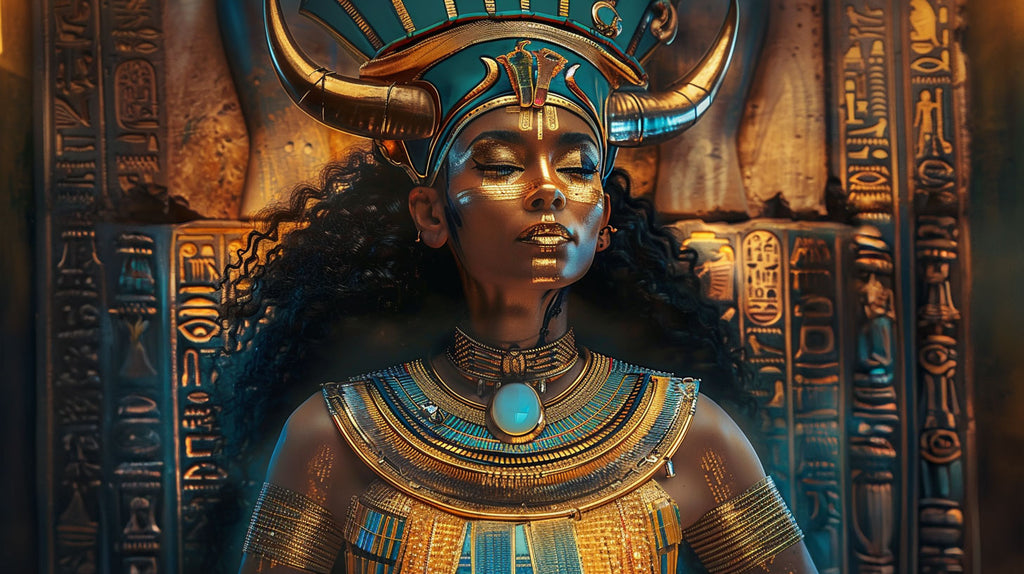
Her association with the Milky Way was described as the "Nile in the Sky," suggesting that just as the Nile River was vital for Egypt's fertility and sustenance on earth, so too was the Milky Way critical for spiritual nourishment and rebirth in the afterlife. This celestial connection underscores Hathor's integral role in both earthly life and eternal existence beyond death.
The celebration of Hathor at her temple in Dendera was a spectacle of joy, music, and dance. These festivities were not just ceremonies but deeply immersive experiences that highlighted joy, music, and fertility. Participants engaged in singing, dancing, and playing instruments as acts of worship, believing these activities pleased Hathor and brought her blessings upon them. The emphasis on music and joy during these celebrations reflects Hathor's broader significance as a deity of happiness and well-being.
Link: Wikipedia
Asase Ya: Earth Goddess of Fertility and Motherhood
Asase Ya is celebrated as the earth goddess of fertility and the mother of all humanity within the Akan religion. Her nurturing and life-giving qualities are deeply respected, symbolizing the earth's capacity to sustain life. This reverence for Asase Ya underscores an essential connection between spirituality and environmental stewardship.

One key aspect of honoring Asase Ya involves adopting sustainable farming practices. Followers believe in giving the land time to rest, adhering to taboo days when no farming should occur. This practice not only respects the goddess but also promotes soil health and biodiversity, principles that modern environmentalists echo.
The annual festival dedicated to Asase Ya is a vibrant testament to community, gratitude, and the renewal of bonds between humans and the earth. During this time, people come together to give thanks for the year’s harvest, acknowledge Asase Ya's blessings, and pray for future abundance. The festival is not just a ritual; it's a communal expression of appreciation that strengthens social ties and reinforces the importance of living in harmony with nature.
Link: Wikipedia
Oshun: Goddess of Rivers, Love, and Fertility
Oshun stands out as the Yoruba goddess of love, beauty, intimacy, and fertility, deeply connected to rivers and fresh water. Her significance goes beyond just being a deity; she embodies the essence of life and prosperity. Known for her pivotal role in creation myths, Oshun's narratives often highlight her diplomatic skills among the Orishas, showcasing her ability to bring harmony and resolve conflicts.
One fascinating aspect of Oshun is her healing powers. It's said that she can cure infertility and bring prosperity to those who seek her blessings. This makes her an essential figure for many looking for hope in times of need. Her connection to water symbolizes purification, renewal, and the flow of life's energies, reinforcing her role as a nurturer.
The annual Oshun festival in Nigeria is a vibrant testament to her enduring legacy. Celebrated with grandeur along the banks of rivers considered sacred, this festival draws pilgrims from across the globe. They come seeking Oshun's blessings for fertility and abundance, participating in rituals and offerings that honor her benevolence.
For more details about the Orisha Oshun, including her powers and relationships with other deities, please check our Oshun Guide.
Nana Buruku: Supreme Goddess of Creation and Wisdom
Nana Buruku holds a paramount position in West African Vodun as the supreme deity, often celebrated as the grandmother of all Orishas. Her significance stretches far beyond her role as a creator; she embodies wisdom and is a potent symbol of the earth's fertility. This dual nature, where she encompasses both male and female energies, sets her apart in the pantheon of deities, highlighting her integral role in creation myths as the originator of the universe.
Her story is not just about power; it's about balance and harmony in creation. Nana Buruku's unique ability to fuse masculine and feminine aspects within herself illustrates a profound message about the interconnectedness of all life forms and the importance of balance in sustaining life. This aspect makes her worship especially relevant in discussions around fertility and motherhood, where these energies are crucial.
In Afro-Brazilian and Caribbean religions, Nana Buruku's veneration takes on additional layers of meaning. Here, she is revered not only for her creative power but also as a powerful ancestral figure, offering protection and guidance. Her presence in these religions underscores the enduring legacy of African spiritual traditions across continents and generations.
For more information about the Orisha Naná Burukú, including her powers and relationships with other deities, please check our Naná Burukú Guide.
Oba: Goddess of Marriage and Domesticity
Oba is a lesser-known Yoruba goddess, often linked with marriage and domestic life. She's known as one of Shango's wives, a powerful deity herself. Her story is a mix of love, sacrifice, and transformation that speaks volumes about her character.
In an effort to win back Shango's favor, Oba made a misguided sacrifice. This act led to her becoming a river, forever separating and yet connecting her with Shango. It’s a tale that underscores the lengths she went for love, making her an emblem of loyalty and commitment.
Despite the tragedy in her story, Oba stands as a symbol of love and perseverance. She represents marital fidelity, showing us the importance of standing by our loved ones even when the going gets tough. Her association with rivers also ties her to the cycles of life and fertility, marking her as a guardian over these essential aspects of human existence.
Her narrative teaches us about the complexities of relationships and the sacrifices sometimes required to maintain them. It’s not just about the loss but also about enduring love and dedication that transcends misfortune.
For more information about the Orisha Oba, including her powers and relationships with other deities, please check our Oba Guide.
Mami Wata: Spirit of Water, Wealth, and Fertility
Mami Wata stands out in the pantheon of water spirits across African and African diaspora folklore, representing more than just a deity. She embodies wealth, beauty, and fertility, making her an essential figure for those seeking blessings in these areas. Unlike other deities that might be tied to a single aspect of life or nature, Mami Wata's influence spans various domains, illustrating her versatility and widespread appeal.
Her worship is a fascinating blend of cultures, showcasing syncretism at its finest. Mami Wata often appears as a mermaid or snake charmer, images that resonate with people from different backgrounds. This cross-cultural depiction not only makes her relatable but also highlights how traditions can merge to create something uniquely powerful.
Devotees engage in rituals and offerings to gain favor from Mami Wata. These practices are deeply rooted in the desire for fertility, health, and prosperity—universal aspirations that touch every human life. By presenting gifts of perfume, fabric, or even elaborate feasts by the water's edge, followers express their devotion and hopes for Mami Wata’s blessings.
For more details about this deity, please check our Mami Wata Guide.
Aje: Goddess of Wealth and Market Prosperity
Aje plays a pivotal role in the Yoruba culture as a deity of wealth and prosperity. This goddess is not just about money; she embodies the very essence of economic transactions and market activities. Her influence extends far beyond simple wealth, touching on aspects of fertility and societal well-being.
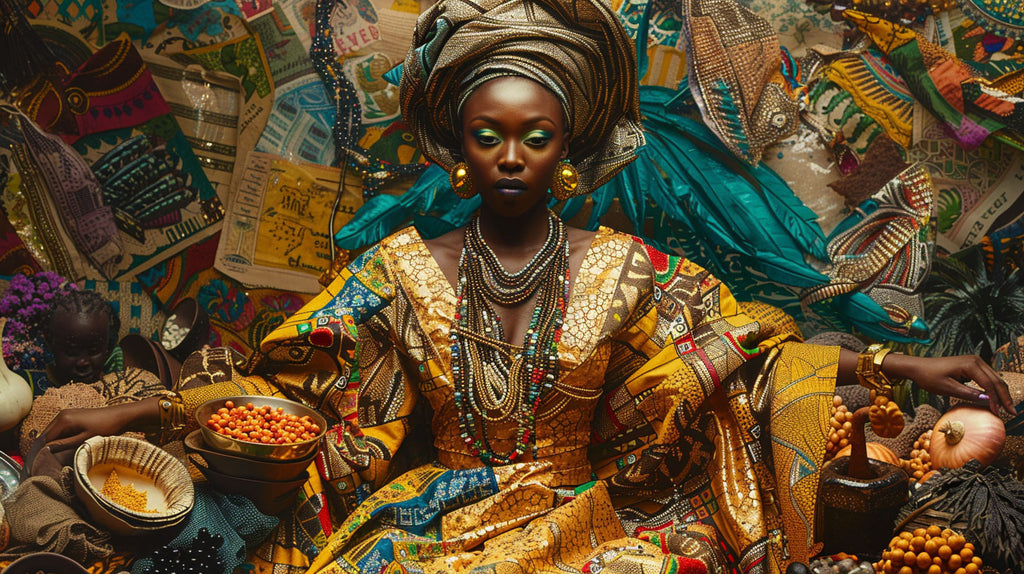
What sets Aje apart is her dual nature. She can bring immense fortune or severe misfortune, making her worship and appeasement crucial for those seeking financial success or fertility blessings. Rituals dedicated to Aje often involve offerings and practices aimed at invoking her favor, which underscores the deep respect and reverence people have for this powerful deity.
Central to Aje worship is the belief that women are natural conduits of her powers. This perspective places women at the heart of economic and familial prosperity, linking them directly with Aje's ability to bless and enrich lives. In societies that honor Aje, wealthy women are often seen as living embodiments of her blessings, commanding respect and admiration for their success.
Our guide on Orisha Aje provides further insights into the capabilities of this deity and how she interacts with other orishas.
Nommo: Ancestral Spirits of Water and Creation
The Nommo are more than just deities in Dogon mythology; they are ancestral spirits revered not only for their role in creating the universe but as nurturers and sustainers of life. Central to the life and culture of the Dogon people of West Africa, the Nommo embody the mystical and practical aspects of existence, much like motherhood itself.

Beyond their celebrated contributions in teaching humans vital survival skills like agriculture, weaving, and blacksmithing, the Nommo's teachings are deeply embedded in the nurturing of society—ensuring that knowledge essential for communal prosperity and wellbeing is passed down through generations. This nurturing role mirrors the responsibilities of motherhood, where the sustenance and educational growth of children are paramount.
In Dogon cosmology, which places great importance on understanding the universe, the sacredness of water is particularly emphasized. For the Dogon, water is the essence of life, a view brought forth by the Nommo. This connection to water highlights their role as life-givers, akin to mothers who are fundamental to the birth and nurturing of life. The Sirius star system, profoundly significant in Dogon belief, is linked with this life-giving force, underscoring the Nommo’s integral role in fostering life, much as mothers do within the human family.
Link: Wikipedia
Final Remarks
Exploring African goddesses associated with motherhood and fertility opens doors to understanding diverse cultural beliefs and the profound respect these cultures hold for women's roles in society. These deities, from Mawu-Lisa's nurturing embrace to Oshun's protective love, highlight the universal reverence for motherhood and fertility as sources of life and continuity. Their stories, deeply woven into the fabric of their respective societies, offer insights into how ancient wisdom continues to influence modern perceptions of femininity, strength, and creation. This journey through mythology not only educates but also reminds us of the shared human experience across different lands and times.
Frequently Asked Questions
Who is Mawu-Lisa in African mythology?
Mawu-Lisa represents a dual deity in the Fon religion of West Africa, symbolizing both the moon (Mawu) and the sun (Lisa). They are often associated with creation, fertility, and parenting, embodying the balance of masculine and feminine energies.
What role does Isis play in motherhood and fertility?
Isis is one of the most prominent goddesses in ancient Egyptian mythology, revered as a symbol of motherhood, magic, and fertility. She's known for her dedication to her husband Osiris and their son Horus, showcasing the essence of maternal devotion.
Can you tell me about Yemoja's significance?
Yemoja is a powerful deity in Yoruba religion, representing motherhood, fertility, and the sea. She's considered the protector of women and children, offering guidance and nurturing to those who seek her blessings.
What makes Hathor special among Egyptian deities?
Hathor embodies love, beauty, music, joy, and fertility in ancient Egyptian culture. She's often depicted as a cow goddess or with cow horns, signifying her role as a nurturing mother figure and protector of women during childbirth.
How is Asase Ya important to agriculture and fertility?
Asase Ya is a revered earth goddess in Akan culture from Ghana. She symbolizes fertility of the land, ensuring bountiful harvests. Her connection to the earth makes her vital for agriculture and also represents maternal qualities of care and provision.
What distinguishes Oshun in terms of love and prosperity?
Oshun is celebrated in Yoruba mythology for overseeing love, beauty, wealth, diplomacy, and water. Her influence extends to matters of fertility and affection; she's seen as a bringer of joy, intimacy, and prosperity to those who honor her.
Who is Nana Buruku in African spirituality?
Nana Buruku is an omnipotent figure in West African beliefs. Regarded as the grandmother of all gods, she embodies primordial energy from which other deities originate. Nana Buruku’s essence encompasses creation itself including aspects like motherhood.
About the Author
Gil Santos
With over 20 years of experience in various narrative mediums, Gil Santos is the singular mind behind Culture Bay. His journey began as a lyricist and web developer, later expanding into crafting dynamic conference presentations and engaging YouTube sketches. This diverse background has allowed him to hone his storytelling skills across different fields. Santos' lifelong passion for sci-fi and fantasy, combined with his knack for interactive storytelling, culminate in Culture Bay - a fusion of innovative ideas and engaging narratives intended for all to enjoy.

